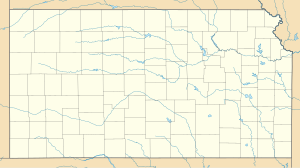Eisenhower Presidential Center
 |
|

The Eisenhower Library
|
|
| Location | 38°54′44″N 97°12′39″W / 38.91222°N 97.21083°WCoordinates: 38°54′44″N 97°12′39″W / 38.91222°N 97.21083°WAbilene, Kansas, USA |
|---|---|
| Named for | Dwight D. Eisenhower |
| Management | NARA |
| Website | Eisenhower Library, Museum and Boyhood Home |
The Dwight D. Eisenhower Presidential Library, Museum and Boyhood Home is the presidential library and museum of Dwight David Eisenhower, the 34th President of the United States (1953–1961), located in his hometown of Abilene, Kansas. The museum also includes his boyhood home, where he lived from 1898 until being appointed to West Point in 1911, and his final resting place. It is one of the fourteen presidential libraries under the auspices of the National Archives and Records Administration (NARA).
Admission to the Visitor Center, Place of Meditation (gravesite), and the archives is free. Admission to the museum is $12 for adults and includes a tour of the Boyhood Home. The complex is open every day except New Year's Day, Thanksgiving and Christmas.
The Eisenhower Presidential complex is only one of two that preceded the close of a presidency, and while this is obviously the case with his boyhood home, construction of the library itself began in 1958, and the museum portion before he even took office, coinciding with the then-General's announcement of his presidential candidacy in June 1952.
As World War II came to an end, admirers of the Supreme Commander of UN forces in Europe decided that he deserved to be honored with a tourist attraction. In 1945, a non-profit foundation was set up to purchase his boyhood home and build a museum on the property. The museum would focus on World War II in general and the military Eisenhower in particular.
The first problem the foundation faced was the General's mother Ida, who was still alive and refused to sell the property. With her death in 1946, another bid to purchase the property was made, this time successfully. The fund-raising tactics of the foundation, however offended the General and his brothers, and this almost scuttled the project. Strict rules were then laid down in a so-called "Gentlemans' agreement" and the General's brother Milton was put in charge.
...
Wikipedia


